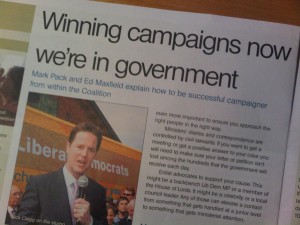Winning campaigns now we’re in government
 Ed Maxfield and I wrote the following piece for ALDC‘s Campaigner magazine:
Ed Maxfield and I wrote the following piece for ALDC‘s Campaigner magazine:
During the election campaign, one of our friends recruited a sprightly new party member – who as filling out her membership form revealed she was well into her nineties. But even she is too young to remember the last time there were Liberals in government outside of wartime. So it’s no surprise that many activists, particularly in England, are unsure how to cope with the practicalities of our party being in government in Westminster.
Being in government offers great opportunities to turn our complaints and our campaigns into actual change. Your tactics and the tone of your argument might change, but we remain a campaigning party. Power is not there to be loved or scared of, but to be used for liberal ends.
Here then are four tips to help you plan a successful campaign – and remember ‘campaign’ is not just short for ‘election campaign’ or ‘deliver leaflets with a petition slip’!
Understand who does what in government
Make sure you know which government department is responsible for the issue you are campaigning on, and be clear about who does what within each department. Most departments will have a Secretary of State (who attends cabinet and leads the ministerial team), a number of Ministers of State (who will each have responsibility for a particular policy area), one or two Parliamentary Under Secretaries of State, and a spokesperson in the House of Lords. Most also have at least one Lib Dem minister but don’t just pick the Lib Dem to contact – make sure you approach the one with the relevant brief. If you are contacting a Liberal Democrat, remember to make use of the knowledge many in the party will have about what messages and approaches most appeal to them.
How to approach ministers
In opposition you might have been tempted to just round up some petition signatures, take a photo and send them off, knowing that there was very little chance of achieving change.
Now it is different, and because of that it is even more important to ensure you approach the right people in the right way.
Ministers’ diaries and correspondence are controlled by civil servants. If you want to get a meeting or get a positive answer to your case you will need to make sure your letter or petition isn’t lost among the hundreds that the government will receive each day.
Enlist advocates to support your cause. This might be a backbench Lib Dem MP or a member of the House of Lords. It might be a celebrity or a local council leader. Any of those can elevate a contact from something that gets handled at a junior level to something that gets ministerial attention.
Making your case fit the coalition’s priorities
There are two key documents that you have to digest if you are to make an effective case to the government. The first is the Coalition Agreement which sets out the government’s priorities for the next five years. Your case will stand a much better chance of success if it fits within the priorities set out in this document. It is available at http://scr.bi/coalitiondoc.
The second is less well known and goes by the catchy title of ‘Coalition agreement for stability and reform’. Only five pages long, it sets out the ‘rules of the game’ for the coalition, explaining how ministers will reach decisions over policy issues. You can find it at http://scr.bi/coalitiondoc2.
It is a tough time to be asking for extra public money (or cutting taxes) but there are some extra spending commitments being made and taxes being cut, going against the general fiscal flow. So if that is what you need to argue for, find a way to frame as being compatible with those commitments.
Get the tone of voice right
You can still run petitions, write letters to ministers, meet MPs. But you need to get the tone right. Be constructive. Explain how your case fits with government priorities. Present a robust and detailed case and explain how the changes you want to see can be delivered in practice.
There are some excellent case studies of successful non-party campaigns out there. www.charitycomms.org.uk and www.ncvo-vol.org.uk both have lots of helpful material.
One final thought. All of the above is second nature to many party members who work in pressure group campaigning or public affairs. So you may well have skills in your local party that are sat there waiting to be used.
or … er …. pay a PR agency ?